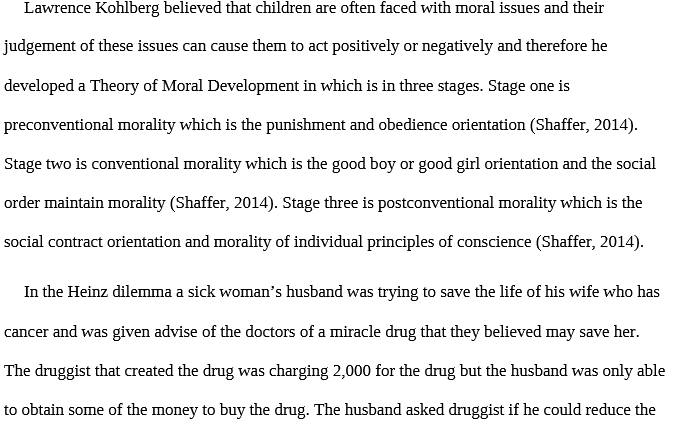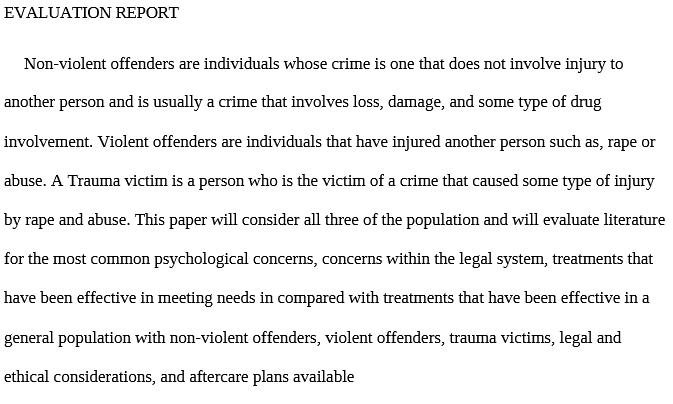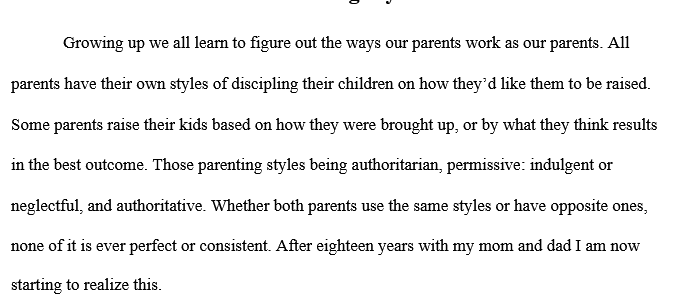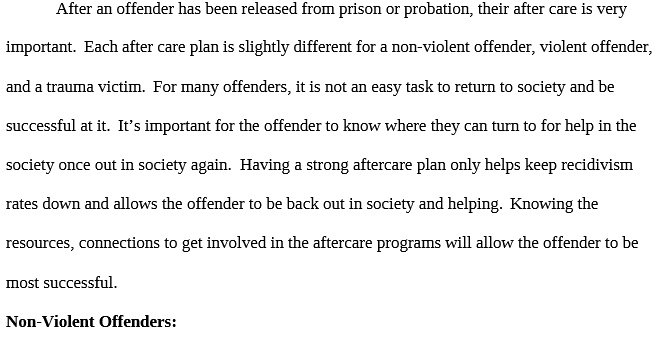Psy 632 Psy/632 Psy632 8-2 Short paper.docx- Snhu
$3.99
Psy 632 Psy/632 Psy632 8-2 Short paper.docx- Snhu
Description
Psy 632 Psy/632 Psy632 8-2 Short paper.docx- Snhu
Psy 632 Psy/632 Psy632 8-2 Short paper.docx- Snhu
Lawrence Kohlberg expanded on the earlier work of cognitive theorist Jean Piaget to try and explain moral development of children. Kohlberg believed that moral development, like cognitive development, follows a series of stages (Lumen, 2018). Kohlberg used moral dilemmas to present conflicts about moral values to teach young boys about morality and values. As presented in this paper, Kohlberg created the Heinz dilemma to discuss the idea of obeying the law and the need to save a life. “Kohlberg emphasized that it is the way an individual reasons about a dilemma that determines positive moral development” (Lumen, 2018). After reviewing a person response, Kohlberg placed them into different stages of moral reasoning. According to Kohlberg, a person progresses from the capacity to per-conventional morality before age nine to capacity for conventional morality in early adolescence and toward attaining post-conventional morality. Kohlberg did believe that only a few achieve formal operational thought.Kohlberg identified three levels of moral reasoning; per-conventional, conventional, and post-conventional.
Psy 632 Psy/632 Psy632 8-2 Short paper.docx- Snhu
Each level is associated with stages of moral development. Stage one and two are presented in per-conventional morality. Stage one focuses on the child’s desire to obey rules and avoid being punished. If an action is perceived as morally wrong because a person is punished; the worse the punishment for the act, the ‘worse’ the act is. Stage two focuses on“what’s in it for me?” In which right behavior is defined by whatever the individual believes to be in their best interest. This shows a limited interest in the needs of others. Concern for others is not based on loyalty but rather “you scratch my back, and I’ll scratch yours” mindset (Lumen,2018). Stage three and four are presented in conventional morality. Stage three focuses on a child wanting the approval of others. A child will act in way to avoid disapproval. Emphasis is placed on good behaviors and people just generally being ‘nice.’ Stage four focuses on a child blindly accepting rules and convention because they place importance in maintaining a functioning society. Rules are the same for every individual and one must obey them because it is what they are supposed to do. This stage is not based on approval like in stage three. “If one person violates a law, perhaps everyone would, thus there is an obligation and duty to uphold laws and rules”(Lumen, 2018). Lastly, stage five and six are presented in post-conventional morality. Stage five focuses on the world being viewed as hold different opinions, rights, and values. Different thoughts should be respected and should be unique to each person.
Psy 632 Psy/632 Psy632 8-2 Short paper.docx- Snhu
- PSY 211 – Lifespan Development (5015 Documents),
- PSY 215 – Abnormal Psychology (4335 Documents),
- PSY 108 – Introduction to Psychology (3759 Documents),
- PSY 223 – Statistics for Psychology Research (2652 Documents),
- PSY 216 – Psychology of Personality (1841 Documents),
- PSY 510 – Research Methods (1748 Documents),
- PSY 520 – Research Methods in Psychology II (1469 Documents),
- PSY 257 – Psychology (1451 Documents),
- PSY 310 – Criminal Psychology (1393 Documents),
- PSY 200 – FOUNDATIONS OF ADDICTIONS (1379 Documents),
Only logged in customers who have purchased this product may leave a review.







Reviews
There are no reviews yet.